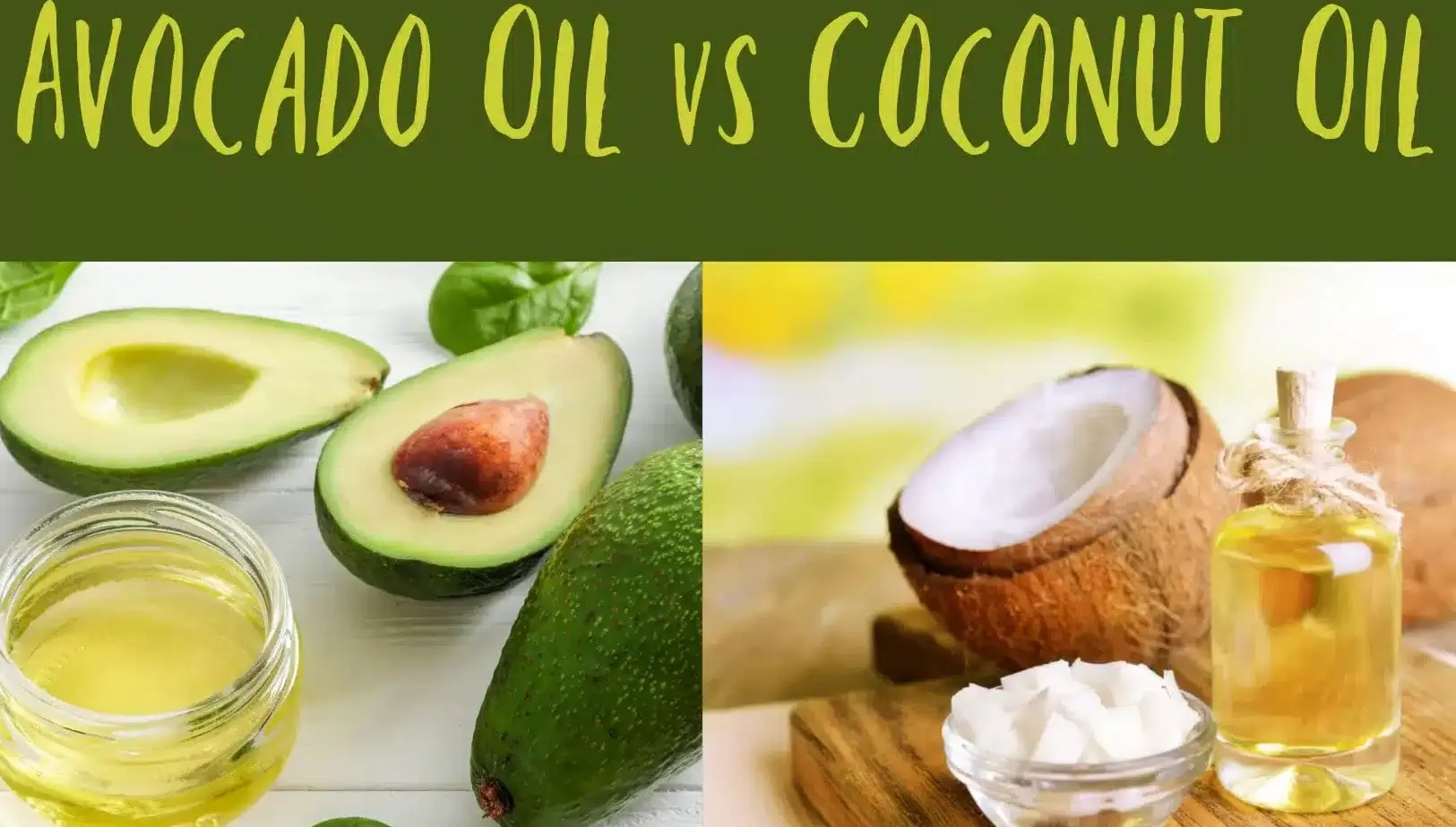Coconut Oil vs Avocado Oil for Skin: A Comparative Analysis
We are hotly welcome to mostbeautytips’ precious visitors. In this article, we are going to explore the comparative analysis of coconut oil vs Avocado oil for skin. So, let’s move toward our topic i.e. coconut Oil vs Avocado Oil for Skin, Coconut Oil for skin, Avocado Oil for skin & Comparative Analysis, the details are given below.
Coconut Oil vs Avocado Oil for Skin
What is Coconut oil: Coconut oil is a white solid fat below around 25 °C, a clear thin liquid oil, an edible oil that is obtained from the kernels, meat, and milk of the coconut palm fruit in warmer climates. Unrefined varieties have a distinct coconut aroma. Coconut oil is used as a food oil and in industrial applications for cosmetics for skin and detergent production.
What is avocado oil: Avocado oil is also an edible oil, obtained from the pulp of avocados, the fruit of Persea americana. Avocado has low sugar, and very high fiber and it has all the multivitamin cofactors that we need (sodium, magnesium, potassium, vitamins A, C, and K, folic acid, vitamin B6, and niacin). It is used as a fit for human consumption both raw and for cooking, where it is noted for its high smoke point. It is also used for lubrication and in cosmetics products.
Coconut Oil for skin care
Coconut oil can be used for dry skin as a deep treatment to maintain dry and damaged skin, freshen the lost moisture, and strengthen the skin barrier to retain it. Coconut oil has also been found to help treat eczema and reduce its symptoms of dry, scaly, and itchy skin that is prone to rashes.
Benefits/advantages of coconut oil:
Coconut oil offers several benefits for skin care:
- Moisturization: Coconut oil is a natural and effective moisturizer. It helps to hydrate the skin, making it soft and supple.
- Antibacterial Properties: It contains lauric acid, which has antibacterial properties. This can help in fighting acne and preventing bacterial skin infections.
- Anti-Inflammatory: The oil possesses anti-inflammatory properties, making it suitable for soothing irritated or inflamed skin.
- Antioxidant Protection: It contains antioxidants that can help protect the skin from free radical damage, which is a common cause of premature aging.
- Sunburn Relief: Coconut oil can be used to soothe and provide relief for sunburned skin, as it has a cooling effect.
- Scar Reduction: Regular use of coconut oil may help reduce the appearance of scars and stretch marks.
- Makeup Remover: It serves as a natural and gentle makeup remover, effectively taking off makeup without harsh chemicals.
- Natural Exfoliant: When mixed with sugar or salt, coconut oil can be used as a natural exfoliant to remove dead skin cells.
- Skin Disorders: Some people find relief from skin disorders like eczema and psoriasis by applying coconut oil, as it can reduce itching and inflammation.
- Lip Balm: It’s an excellent natural lip balm, keeping lips soft and preventing chapping.
Disadvantages of coconut oil:
While coconut oil has many potential benefits for skin care, it’s important to be aware of some of its disadvantages and potential drawbacks:-
- Comedogenicity: Coconut oil is considered highly comedogenic, which means it has a high likelihood of clogging pores. This can lead to acne breakouts and worsen existing acne conditions, particularly for those with oily or acne-prone skin.
- Allergic Reactions: Some individuals may be allergic to coconut oil, experiencing skin rashes, itching, or redness upon application. It’s essential to perform a patch test before using it widely on the skin.
- Greasy Texture: Coconut oil can feel greasy on the skin, which may not be comfortable for everyone, especially in hot and humid climates.
- Staining: The oil can leave stains on clothing and fabrics, which can be difficult to remove.
- Not Suitable for All Skin Types: People with sensitive or dry skin might find coconut oil too harsh, as it may cause further dryness or irritation.
- Lack of Scientific Evidence: While there are anecdotal reports of coconut oil’s benefits, there is limited scientific research on its effectiveness for various skin conditions, and individual results may vary.
- Pungent Odor: Some individuals find the natural scent of coconut oil to be overpowering and unpleasant.
- Reactivity with Other Products: Coconut oil may not be compatible with certain skincare products or makeup, potentially leading to adverse reactions or reduced efficacy.
- Storage and Shelf Life: Coconut oil can solidify or become rancid if not stored properly. This requires keeping it in a cool, dry place and using it within its shelf life.
- Risk of Sun Sensitivity: Although coconut oil provides some natural sun protection, it’s not a substitute for dedicated sunscreen and may not offer sufficient protection for extended sun exposure.
Avocado Oil for skin care
For eating healthy meals and for cooking flavorfully, Avocado oil is a great source. It is a wonderful way of antioxidants, essential fatty acids, minerals, and vitamins. The absorbent oil is thought to have numerous benefits for your skin, like moisturizing dry hands or acting as a natural sunblock. You can apply avocado oil directly to your skin or mix it with your favorite beauty products.
Benefits/advantages of Avocado oil:
Avocado oil offers several benefits and advantages for various uses, including skincare and overall health:-
- Excellent Moisturizer: Avocado oil is highly moisturizing and is easily absorbed by the skin. It helps to keep the skin hydrated and prevent dryness, making it particularly beneficial for those with dry or sensitive skin.
- Rich in Nutrients: It is loaded with essential nutrients such as vitamins A, D, and E, as well as omega-3 fatty acids. These nutrients promote skin health, help reduce inflammation, and support collagen production.
- Antioxidant Properties: Avocado oil contains antioxidants that protect the skin from free radical damage, reducing the signs of premature aging and supporting overall skin health.
- Wound Healing: It may aid in wound healing and the recovery of skin conditions due to its ability to stimulate collagen production.
- Soothes Irritation: Avocado oil is known for its anti-inflammatory properties, making it effective in calming irritated or sunburned skin.
- Acne Management: Avocado oil’s anti-inflammatory and antimicrobial properties can help in managing acne-prone skin. It can also reduce redness and inflammation associated with acne.
- Reduces Wrinkles: Regular use of avocado oil may help minimize the appearance of fine lines and wrinkles, keeping the skin looking youthful.
- UV Protection: Avocado oil contains natural sun protection properties and can provide some defense against UV rays. However, it should not replace dedicated sunscreen.
- Hair Health: Avocado oil is also beneficial for hair care. It can improve hair strength, shine, and manageability while reducing frizz and dandruff.
- Cooking and Nutrition: In addition to its topical benefits, avocado oil is a healthy cooking oil rich in monounsaturated fats, which can have positive effects on heart health and overall well-being when used in culinary applications.
- Cuticle and Nail Care: Avocado oil can be applied to the cuticles and nails to keep them moisturized and prevent brittleness.
- Massage Oil: It makes an excellent base for massage oils due to its smooth texture and skin-friendly properties.
Disadvantages of avocado oil:
While avocado oil offers numerous benefits for skin care, there are some potential disadvantages and drawbacks to consider:-
- Price: Avocado oil can be more expensive than other common skincare oils, which may not be budget-friendly for some individuals.
- Comedogenicity: Like coconut oil, avocado oil can be comedogenic for some people, potentially clogging pores and leading to acne breakouts. Those with acne-prone or oily skin should be cautious when using it on the face.
- Allergic Reactions: Some individuals may be allergic to avocado oil, experiencing skin irritation, redness, or itching upon application. It’s important to conduct a patch test before using it widely.
- Thicker Texture: Avocado oil has a thicker consistency compared to some other oils, which may not be suitable for those who prefer lighter oils or live in humid climates.
- Sensitivity: People with very sensitive or reactive skin may find that avocado oil causes redness or irritation, especially if they have a pre-existing skin condition.
- Odor: Avocado oil has a mild, natural scent that some individuals may find unappealing.
- Potential Shelf Life Concerns: Avocado oil can go rancid over time, and it is important to store it properly in a cool, dark place to maintain its freshness. This can be a concern if the oil is not used regularly.
- Staining: Like many natural oils, avocado oil can leave stains on clothing and fabrics, which can be challenging to remove.
- Limited Scientific Research: While avocado oil has been used for skincare for a long time, there may be limited scientific research on its efficacy for certain skin conditions.
- Individual Variability: The effectiveness of avocado oil can vary depending on an individual’s skin type and specific needs. It may not work equally well for everyone.
Comparative Analysis
The comparative analysis of coconut oil vs. avocado oil for skin care is essential in understanding the advantages and disadvantages of each oil, helping individuals make informed choices based on their specific needs and skin type.
| Aspect | Coconut Oil | Avocado Oil |
| Origin | Coconut palm fruit | Avocado fruit (Persea americana) |
| Composition | High in lauric acid | Rich in essential fatty acids, vitamins, antioxidants |
| Moisturization | Effective but can feel greasy | Highly moisturizing, easily absorbed, great for dry/sensitive skin |
| Comedogenicity | Highly comedogenic, may clog pores | Can be comedogenic, more suitable for dry/sensitive skin |
| Allergic Reactions | May cause allergies and skin reactions | Potential for allergies, patch testing recommended |
| Nutrient Content | Contains lauric acid with antibacterial properties | Rich in vitamins A, D, E, omega-3 fatty acids, supports skin health |
| Skin Disorders and Irritation | Known to help with eczema and soothe dry, itchy skin | Effective for calming irritated or sunburned skin |
| Sun Protection | Offers some natural sun protection but is not a substitute for sunscreen | Provides some UV defense but is not a replacement for sunscreen |
| Cosmetic and Cooking Uses | Used in cosmetics and cooking; unique flavor | Ideal for cooking with a high smoke point; used in cosmetics |
| Price and Storage | Generally affordable, requires proper storage | May be more expensive, and needs careful storage to prevent spoilage |
| Compatibility and Individual Variability | Varies based on individual skin type and preference | May not work equally well for everyone, consider patch testing |
| Overall Recommendation | Effective moisturizer with antibacterial properties, good for eczema | Highly moisturizing, rich in nutrients, ideal for dry/sensitive skin |
| Suggested Usage | Suitable for a wide range of skin types, best for body or patch testing | Best for dry/sensitive skin; use sparingly on the face and patch test |
FAQs about Coconut Oil and Avocado Oil for Skin:
1. Which oil is better for moisturizing the skin, coconut oil, or avocado oil?
Avocado oil is highly moisturizing and easily absorbed, making it a better choice for dry or sensitive skin. Coconut oil can also moisturize but may feel greasier on the skin.
2. Can I use coconut oil and avocado oil for acne-prone skin?
Both oils may have benefits for acne-prone skin. Coconut oil contains lauric acid with antibacterial properties, while avocado oil has anti-inflammatory qualities. However, individuals with acne-prone skin should perform patch tests to check for compatibility and consider their skin type.
3. Are there any potential allergic reactions to these oils?
Yes, both coconut oil and avocado oil can cause allergic reactions in some individuals, leading to skin irritation or redness. It’s essential to conduct a patch test before using these oils widely on your skin.
4. Can coconut oil and avocado oil be used for cooking?
Yes, both oils are used in cooking. Coconut oil is known for its unique flavor and is used for a variety of culinary applications. Avocado oil is appreciated for its high smoke point, making it suitable for high-heat cooking.
5. Does coconut oil darken skin?
Coconut oil is generally not known to darken the skin. Some people use coconut oil for skin care purposes, believing it may help lighten or even out their skin tone. While coconut oil contains various compounds like fatty acids and antioxidants that could potentially reduce pigmentation and the appearance of dark spots, its effects on an individual’s skin can vary. However, it’s essential to note that coconut oil may not produce significant skin-lightening results for everyone. If you have concerns about skin darkening or specific skin conditions, it’s a good idea to consult with a dermatologist for personalized advice and recommendations.
6. Which oil is better for addressing specific skin conditions like eczema and dry, itchy skin?
Coconut oil is known for its potential benefits in treating eczema and soothing dry, itchy skin. However, individual responses may vary, and some may find avocado oil more suitable, especially for sensitive skin. It’s advisable to consult with a dermatologist for personalized recommendations.
Bottom Line:
When we are comparing coconut oil vs avocado oil for skin, each has its unique advantages and disadvantages. Coconut oil is a good moisturizer with antibacterial properties and potential benefits for conditions like eczema, but it can clog pores and feel greasy. Avocado oil excels in moisturizing, is rich in nutrients, and has anti-inflammatory and antioxidant properties, but it may be more expensive and comedogenic for some. Both oils are versatile for cooking and cosmetics, but the choice should depend on individual skin type, preferences, and the need for patch tests. Consulting a dermatologist for personalized advice is a wise approach to making the best selection.







